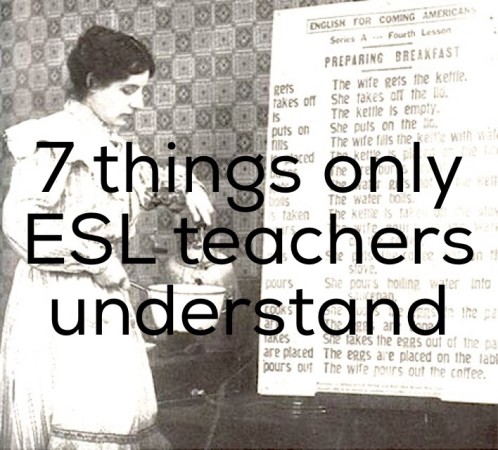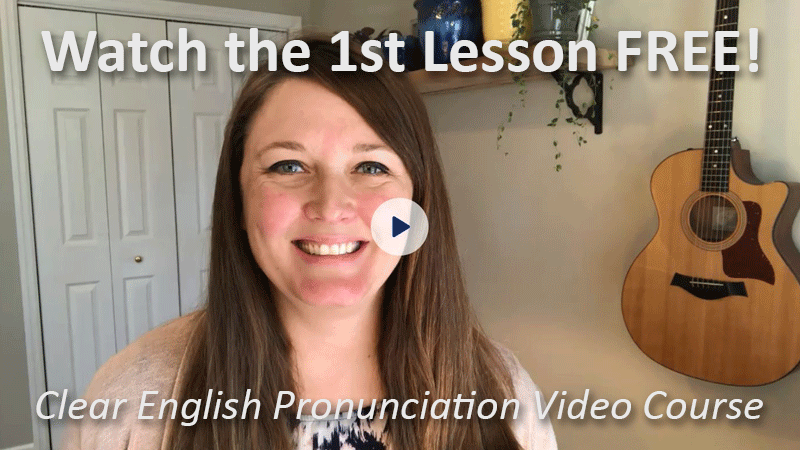 Seven things only ESL teachers understand
Seven things only ESL teachers understand
1) You speak in broken English more often than you would like to admit.
I often hear ESL teachers complain that their English has gotten significantly worse since they started teaching English. Let me just say: You’re not imagining it. We can’t seem to find simple words and phrases after a long day in the classroom. Every bit of our mental energy is being poured into communication while we are working with our students. Once we step out of that classroom, that mental energy stops. ESL Teacher 1: “What’s the name of that place that you go to when you need to buy a hammer and nails?” ESL Teacher 2: “Ugh, I can’t think of it. The words have completely slipped my mind.” ESL Teacher 1: “You know, like Lowe’s or Home Depot. Where you can buy paint or a ladder? What kind of store is that?…and why can’t I think of the name?” ESL Teacher 2: “I’m right there with you.”
2) You can act out any word in the dictionary.
I have never been much of an actor. Yes, I was part of the chorus in my high school’s productions of “Hello Dolly” and “Oklahoma”, but there’s a reason I was not center stage. Acting has never been my strong suit. That being said, I could win an Oscar for my vocabulary charades ability. It’s become an art form. Any ESL teacher can testify that we will do anything to get out point across. Our students laugh as we flop our arms around and contort our faces to show just the right amount of emotion. No matter how ridiculous we look, we make sure they catch the meaning.
3) You often serve as an English-to-English translator.
I can’t tell you how many times I have passed an ESL student trying to communicate with a native English speaker, and noticing that the native English speaker cannot understand my student, I step in and repeat with my student said in English. Last week, one of my students was trying to communicate with a cafeteria employee. She was explaining that she wanted to scan her card twice so that her friend could come in. The cafeteria worker tried very hard to understand what the student was saying, but she just couldn’t understand. The ESL student even repeated herself three times. I understood all three times. I finally leaned over and explain to the worker what the student was saying. It’s part of what makes our job challenging. We can understand the broken English of our students, so we sometimes overlook the errors they so desperately need us to correct.
4) Your blood starts to boil when someone talks derogatorily about immigrants.
ESL teachers have a front row seat to the lives of immigrants. We have heard the stories of the challenging backgrounds of our students. We have spoken through translators to their parents. In some cases, we have even cried with them. That’s why we tend to take issue when an insulting comment is made about immigrants. We believe in the potential of our students, no matter where they come from. We are advocates for them on a daily basis, and that doesn’t stop just because politicians pander otherwise.
5) You will never forget that one student who got you into teaching ESL.
Practically every ESL teacher I know got into this profession because they formed a special bond with one particular ESL student. Meeting that person changed your life forever, because you never could quite look at the world or yourself the same again. The very first student I taught was a Korean woman named Helen. We met in the basement of her dorm, as we slowly moved through her textbooks. Helen had low English proficiency, and watching the light bulb come on for her day after day was thrilling. Tutoring her sparked a fire in me for ESL that only burns brighter with each passing year.
6) You can’t help but tell your friends the hilarious things your students (accidentally) say.
The most annoying part about hearing a hilarious mistake in class is that no other fluent English speakers were there with you to get the “joke”. My most hilarious teaching moment happened when I first started teaching. I was having students read aloud. One student who comes from a language background that mixes up “f” and “p” sounds read a sentence that included the word “puck”. That’s certainly not how she pronounced it, though. It was such a shocking moment for me that my mouth fell open, but when I looked around the room, not one other person had noticed that an f-bomb had just been dropped. A few semesters ago, my fellow teacher friends and I had a white board in the staff room where we wrote down the most humorous errors our students made. My favorite was from a student essay: “Like a baby don’t need high heels, we don’t need to get so many education.” (I would beg to differ!)
7) You have a free place to stay in about 27 countries around the globe.
The absolute best part about being an ESL teacher is meeting unique individuals from diverse backgrounds. For the most part, I have found ESL students to be some of the most grateful and motivated students you can find. I’ve heard “You are welcome to my country” about 100 times, and most of them actually mean it! I have yet to take a student up on their offer to visit them or their relatives in another country, but if I did take all my students up on their offers, I could have free housing in every corner of the globe. ….. What would you add to the list?
 Seven things only ESL teachers understand
Seven things only ESL teachers understand

